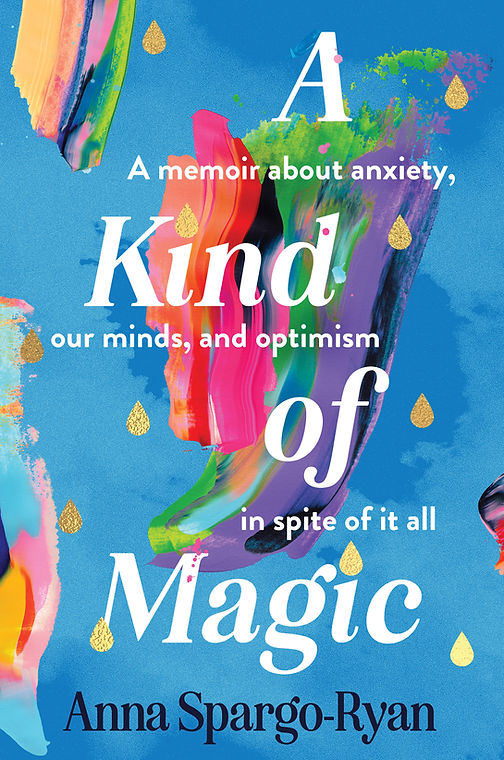From acclaimed author Anna Spargo-Ryan comes A Kind of Magic, a tender, and at times, wry insight into complex mental illness, and indeed, the moments of magic in among it all. BroadAgenda editor Ginger Gorman had a chat with Anna about her stunning new work.
In a nutshell, what’s your book about?
A Kind of Magic is a memoir about life with anxiety: how it starts, why it happens and how we can understand it.
You said that, “Writing it [A Kind of Magic] has transformed the way I understand myself and this kaleidoscope life.” Can you unpick this for me?
When I started writing, I was very angry. I didn’t realise it at the time – or if I did, I felt justified and virtuous in my anger. I wrote about terrible things that had happened and people who had wronged me, and the way no one understood how I felt and how isolating it all was.
At the same time, I was researching the way memory works. I’ve always struggled with memory, particularly with big gaps in what I remember, and I was trying to understand if there was a reason for it.
As I wrote (angrily) and researched (earnestly), I learned that trauma and some mental illness changes the way memory works. It affects what we remember and what we use those memories for. We’re more likely to remember negative memories and more likely to combine multiple events into giant, awful memories.
From there, I learned about identity. We form a self based on what we remember – even if we can’t consciously recall these formative moments, they can exist in other parts of our memory. People who live with trauma are more likely to remember negative things and therefore more likely to build their identity on a negative sense of self.
As I learned these things about myself, I understood who I was better than I ever had before. I recognised there was a scientific basis for my confusion and anger, and that helped me to contextualise and reimagine it.
By the time I got to the end of the book, I understood myself in a whole different way. I didn’t want to write about terrible things and people – I wanted to share what I’d learned with others who might also find peace in it.

A Kind of Magic is by Anna Spargo-Ryan.
What do you mean when you say it’s an “‘anti-self-help book”?
To my mind, a self-help book is paradoxical – directing a reader to think or behave in a certain way. I wanted to write a book that would help someone feel comforted through a process of learning and being seen, I think. A book that’s also a friend. You know how when you’re supported to be courageous? That’s what I want the book to do.
As someone who has dealt with Australia’s mental health system myself – as a reporter but also in attempting to get support myself and on occasion for someone close to me – I know there are massive gaps in the mental health system. What can you tell me about that?
I’m not sure there’s a succinct answer to this! There are shortfalls at every step of getting mental health care: a lack of government funding, a lack of private funding, a shortage of psychologists and psychiatrists, exorbitant gap payments, poor access especially in regional and rural areas, stigma, dangerous public mental health hospitals, poor communication between patients and clinicians, no standardised performance criteria for therapists … it goes on and on.
The work to get the right help is extensive and complex enough without also being unwell on top of that. I wrote something in the book like: you have to be both well enough to figure out how to navigate it and unwell enough for someone to believe you need help.
You’ve said to me previously “the whole mental health industry is gendered.” What do you mean?
The whole mental health industry is gendered. Men are more likely to complete suicide by a significant factor. Women are more likely to live with debilitating depression and/or anxiety. More women than men experience high levels of psychological distress.
This has been true since before there was a “mental health industry” – women have long been “too emotional”, “hysterical”, these gendered words without nuance. As with so many aspects of women’s healthcare, men have charged themselves with the policy and governance, men have made decisions about our needs, men have controlled our bodies and minds.
The mental health model is male-centric, as so many medical models are. It’s the same reason women die of heart attacks – the way the medical industry treats them is modelled on a man’s heart attack.
We can see this in action in the under-diagnosis of girls and women with ADHD, which is not a mental illness but has crossovers (both in symptoms and genetics) with bipolar and borderline personality disorder. For decades, it wasn’t identified – and so opportunities for early intervention were missed – because it simply didn’t look the same in girls as it does in boys. So, no one saw it.

Anna hopes her book with support others to be courageous. Picture: Supplied.
In your writing, you’ve mixed brutal honesty with meticulous research and compassion. Why did you take this approach?
Mental illness is hard to understand and hard to articulate. At one level, I was worried about reinforcing a stereotype – being self-indulgent, being hard work, all the things I had internalised about myself.
I wanted to counter that perception by sharing the research and contextualising it. Because these things are so poorly understood, I wanted to draw connections between what the science tells us and what the lived experience looks like.
And I wanted to do that for two discrete groups of people: those who would see themselves in it and be reassured; and those who don’t share the experience but need to be schooled. Basically.
What do you want people to take away from this book?
I want this book to be part of moving mental health care forward. That’s a complex ask, so I want it to be different things to different people. I want it to offer clinicians better ways of understanding and talking to patients, so they can provide more effective treatment. I want policymakers and politicians to read it and reimagine what “a person with mental illness” looks like and what they need. I want a carer to recognise their own enormous effort and the gratitude I – and people like me – feel for what they do. I want the wider population to come away with new vocabulary and empathy.
And for those who live with mental illness, like I do, I want them to feel like someone’s glad they’re here.
Picture at top: Editor, writer and cat lady, Anna Spargo-Ryan. Photo: Supplied
- A Kind of Magic is out now.
Ginger Gorman is a fearless and multi award-winning social justice journalist and feminist. Ginger’s bestselling book, Troll Hunting,came out in 2019. Since then, she’s been in demand both nationally and globally as an expert on cyberhate and the real-life harm predator trolling can do. She's also the editor of BroadAgenda and gender editor at HerCanberra. Ginger hosts the popular "Seriously Social" podcast for the Academy of the Social Sciences in Australia. Follow her on Twitter.





